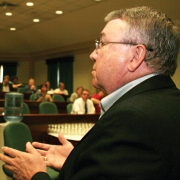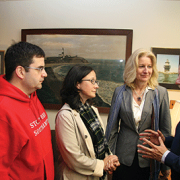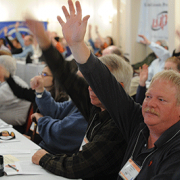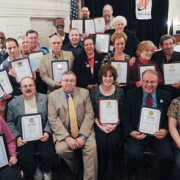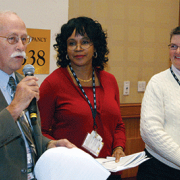|
We knew it wasn’t going to be easy. But few expected that SUNY would be under attack on so many fronts, and that the battle would be brought right into our living rooms. That happened in May, when Gov. David Paterson—who has done more to harm education than any governor in state history—attempted in an emergency spending bill to impose a weekly one-day furlough on more than 100,000 unionized state workers to cut costs until a state budget is passed. We threw a monkey wrench into those works. UUP—along with Professional Staff Congress/CUNY, CSEA and PEF— won a May 11 federal temporary restraining order to block the furloughs. The governor had a May 26 court date to “show cause” why the furloughs shouldn’t be stopped. This issue, as well as the 2010-11 state budget, were still unresolved as The Voice went to press. Before moving forward with furloughs, Gov. Paterson threatened layoffs and called for a lag payroll. He insisted we forego contractual salary increases, and then gave huge raises to a number of his aides. He quickly rescinded their raises after news outlets got wind of the spending. If the governor wants to talk, we’ll listen. But any deal worth considering will go to members for ratification, since it constitutes reopening our contract. Our members—not the governor—will control this situation. SUNY, by the way, stood by quietly as the governor cut campus budgets and forced the furlough issue. SUNY’s Board of Trustees sat still in April, when Stony Brook closed its Southampton campus for “budgetary reasons. Inexplicably, SUNY found $3 million this year to operate The Levin Institute, an entity that lost its state funding last year. That doesn’t mean that SUNY’s leaders have been complacent. Far from it. Over the last few months, they kicked into high gear a campaign to press for approval of the Public Higher Education Empowerment and Innovation Act (PHEEIA), which would allow SUNY schools to raise tuition, and enter into contracts, leases, and other business ventures without state oversight. UUP opposes PHEEIA because we believe it is anti-union, will privatize SUNY, reduce access and erode educational quality. We have stepped up our resistance to PHEEIA. Our members have made hundreds of visits to legislators and sent thousands of e-mailed faxes urging them to dismiss the Act. We created our Save SUNY website (www.savesuny.org), a Facebook page and a Twitter account to protest PHEEIA and state budget cuts to SUNY. We also ran television, Internet and print campaigns against PHEEIA and Paterson’s cuts to SUNY, the state’s public hospitals and the New York State Theatre Institute. So here we are without a state spending plan, more than two months after the state’s April 1 budget deadline. Let’s use their delay to continue urging legislators to restore the $152 million in state aid cuts slated for SUNY. If those cuts go through, SUNY will have lost more than $562 million—or nearly 25 percent of its operating budget—over the last two years! Rest assured, no matter what happens, we will hold the chancellor to her recent promise to expend $147 million in SUNY reserves to help cover state aid cuts. Now more than ever, we need you, our members, to take a stand for SUNY. Tell students, parents, business owners and other unionized workers about our fight and what saving SUNY can mean to them and all New Yorkers. Visit your legislators and tell them to restore cuts to SUNY, turn away PHEEIA and to vote no on any proposals advanced by the governor to breach our hard-won contract. We negotiated that contract in good faith. We are expected to uphold our obligations under the contract and we will. The governor should do the same.
|
An uphill battle: UUPers continue to fight the mounting challenges confronting SUNY
|
UUP advocates had a major challenge to begin with. It came in the form of $152 million in additional budget cuts to SUNY and the proposed so-called Public Higher Education Empowerment and Innovation Act (PHEEIA). Then the governor introduced a furlough plan affecting most UUP members. The furlough was part of a weekly budget extender bill in early May that would keep state government operating in lieu of a new state budget. Faced with the specter of a state government shutdown if they failed to act, the Legislature reluctantly approved the bill and the furloughs. Within hours of the bill’s passage, UUP moved to stop the furloughs. The union—along with PEF, CSEA and Professional Staff Congress/CUNY—filed a lawsuit May 11 in U.S. District Court in Albany charging the furloughs were unconstitutional because they violate the article barring states from passing legislation that impairs contract obligations. UUP’s lawsuit included a temporary restraining order to block the furloughs. Little more than 24 hours later, the judge granted the restraining order, preventing the furloughs from going forward pending a final ruling on the lawsuit. Delegates to UUP’s Spring Delegate Assembly cheered when UUP President Phillip Smith held up a copy of the May 13 edition of the Albany Times Union that bore the headline, “100,000 to stay on the job.” “The fact that the judge ruled for the temporary restraining order so quickly is a good sign for us,” Smith told the delegates, reflecting optimism that UUP would prevail in court. That final ruling had not been made as The Voice went to press. Smith pledged that whatever happens, the union would take no action that would give the governor or the SUNY chancellor control of their contract. “Any plan that doesn’t meet our needs will be rejected. If it does meet our needs, it will go to the full membership for ratification,” Smith vowed. Most of UUP’s efforts to protect its members and SUNY took place not in the judicial arena, but in the legislative one. Members flocked to Albany for a series of advocacy days throughout March, April and May, meeting with state lawmakers to express their concerns and to seek their support. “I don’t know how SUNY can take another $152 million cut,” Outreach Committee Co-chair Glenn McNitt of New Paltz told Sen. Kemp Hannon (R-Garden City). “It would demolish it.” Abe Gerecht of Brooklyn HSC stressed the importance of funding SUNY when he told Assemblywoman Linda Rosenthal (D-Manhattan), “Education is a necessity, not an expense.” Lawmakers were told the prior budget cuts had already taken their toll on SUNY in the form of fewer course offerings, crowded classrooms and delayed graduations. “Campuses have come to the point where we have 150 students in an English class,” Oneonta Chapter President William Simons told Assemblywoman Barbara Clark (D-Queens Village). Clark also heard UUP’s appeal to save the New York State Theatre Institute, which is in danger of losing its state funding. “The theater institute is in peril,” warned Linda O’Malley of NYSTI. “We’re primarily an educational institution. Arts education is vitally important.” UUP advocates also continued waging the fight against PHEEIA, even challenging one of its chief backers, Assemblyman Mark Schroeder (D-Buffalo). UUP Vice President for Academics Frederick Floss responded to Schroeder’s claim that opposing the bill hinders job growth in western New York. “UUP is not hindering job growth,” Floss said. “This bill says you’re going to privatize SUNY and take away all your (the Legislature’s) oversight power.” PHEEIA figured prominently in UUP’s fight against the sudden decision to close Stony Brook’s Southampton campus. Just days after the Stony Brook administration announced the controversial closure, UUP’s Stony Brook Chapter forged a coalition with Southampton students. The result: Nearly 100 students joined with UUP advocates to meet with lawmakers on the issue. The UUP advocates served as mentors for the students, providing them guidance on advocacy prior to their visits. Stony Brook Chapter President Arthur Shertzer asserted that if PHEEIA passed—removing legislative oversight over SUNY—more such unilateral closures could occur. “What’s to stop SUNY from closing other schools?” Shertzer asked during a meeting with state Assemblyman Fred Thiele (I-Bridgehampton). “The chancellor and the SUNY Board of Trustees want to run SUNY without the Legislature.” In another cooperative advocacy effort with students, about 30 UUP members enlisted the help of more than 100 students from SUNY’s Equal Opportunity Program (EOP) and Equal Opportunity Centers (EOC) to jointly urge lawmakers to fund the programs. “We’ve got to send the message that these programs are critical,” Darleyne Mayers of Farmingdale told Sen. Carl Marcellino (R-Oyster Bay). “We can’t allow state cuts to kill the academic and economic dreams of these students.” Farmingdale EOP student Patrice Glenn, a single mom, said she wouldn’t be studying to become a licensed practical nurse at Farmingdale without the EOP. The EOP provides academic support and financial aid to low-income students who want to attend college. EOCs help prepare students for college or vocational training programs. But the programs face reductions as part of proposed state budget cuts to SUNY. Students like UAlbany’s Sheryl Berkow shared their success stories. “It’s sad to think that something like education, our dream, may be taken from us,” Berkow told an aide for Republican Assemblyman George Amedore Jr. (R-Amsterdam). — Donald Feldstein |
Non-renewed? You may be eligible for jobless benefits
|
The continuing state budget crisis heightens the possibility that academics and professionals could receive notices of non-renewal. Members involuntarily separated from payroll without a reasonable assurance of employment may qualify for unemployment insurance benefits. Unemployment insurance is temporary income for eligible workers who become unemployed through no fault of their own and who are ready, willing, and able to work. A contract contingent on student enrollment, funding, program needs, etc., should not be considered reasonable assurance of employment in the next semester. You can apply for unemployment benefits using the state Labor Department’s Benefits Online Page (http://ui.labor.state.ny.us/ UBC/home.do?FF_LOCALE=1) between 7:30 a.m. and 7:30 p.m. Monday through Thursday, 7:30 a.m. to 5 p.m. Friday, all day Saturday, and until 7 p.m. Sunday. — Donald Feldstein |
2010 Spring DA – Fired up: Delegates ready to fight attacks; elect officers, board
|
Delegates to the 2010 Spring Delegate Assembly in Albany covered a wide range of union business during their policymaking convention May 14-15. They elected officers and Executive Board members, debated policy, adopted the union’s 2010-2011 budget, attended meetings, wrote and faxed lawmakers to support SUNY, listened to committee and officers’ reports, and honored their colleagues for outstanding newsletters and websites. They also heard about the mounting challenges confronting public education in general and SUNY in particular, and heard UUP President Phillip Smith vow to reject any scheme to weaken the union’s negotiated contract. Read on for highlights. UUP President Phillip Smith used his State of the Union address to get delegates to the 2010 Spring Delegate Assembly fired up about furloughs, the Public Higher Education Empowerment and Innovation Act (PHEEIA), the SUNY Strategic Plan and myriad other attacks raining down on public higher education. Smith outlined SUNY Chancellor Nancy Zimpher’s step-by-step plan to wrest power over the University from lawmakers and the public by pushing for passage of PHEEIA, and criticized her strategic plan for failing to promote research and learning. “This is all about power,” Smith said. “This is not about SUNY. It’s not about students. And it’s certainly not about us.” He vowed that “UUP will not be brought to its knees” by SUNY administrators or state politicians hell-bent on destroying the union and privatizing the University. Likening UUP’s situation to that of Henri Charriére, played by Steve McQueen in the movie Papillon, Smith said Charriére is a convict whose spirit and courage sustained him through two years of solitary confinement. “Once outside, hunched over and nearly blind, he faced the administration building where the warden and officers of the prison resided. In a quivering voice, he said, ‘I’m still here, you bastards.’” “We must activate the membership to turn things around,” Smith added. “And, by God, we can say: You bastards, we’re still here.” Smith called on the nearly 300 delegates in attendance to remain diligent in educating students, community members, business owners and lawmakers on the dangers of PHEEIA and other privatization schemes, and to keep UUPers abreast of anti-union tactics designed to pit rank-and-file members against union leaders. Delegates responded by writing letters and sending hundreds of computer faxes to lawmakers from the union’s Political Action Center, and adopted a 10-committee resolution calling for a detailed action plan to combat PHEEIA, the strategic plan, and SUNY Board of Trustees’ changes in general education requirements. “Once more, it’s up to us,” Smith said. “We are making our intellect and our influence count. With your support, involvement and advocacy, we will continue the fight, so that SUNY will remain open to families of low and moderate income.” DA delegates re-elected three statewide officers and three Executive Board members. Two first-time board members were also elected to two-year terms during the two-day convention. Vice President for Academics Frederick Floss defeated challenger Patricia Bentley of Plattsburgh, 157-116. Vice President for Professionals John Marino and Treasurer Rowena Blackman-Stroud were re-elected without opposition. Returned to the statewide Executive Board were Jamie Dangler of Cortland, who was challenged by M. Steve Pendleton of Buffalo Center, 175-102; Philippe Abraham of Albany, who was challenged by fellow incumbent Carolyn Kube of Stony Brook HSC, 145-128; and Kube, who later won re-election against challenger Raymond Dannenhoffer of Buffalo HSC, 145-125. Newly elected to the board was Ray Gleason of Alfred, who ran unopposed in his bid for the seat representing technology colleges. James Engle of Morrisville was successful in his bid in a runoff election with Jacqualine Berger of Empire State College, 155-113. The first contest included incumbent Peter D.G. Brown of New Paltz, whose 88 votes were not enough to get him in the runoff race between Engle, 96, and Berger, 91. The new leaders take office June 1. A number of resolutions were debated during the convention. Delegates: • Asked UUP to recognize people with disabilities, and to work to ensure inclusive campuses that provide quality experiences and work lives for members. • Condemned Arizona Immigration Law SB1070, which requires police to determine the immigration status of a person they believe to be in the U.S. unlawfully. Delegates also directed UUP to send letters of condemnation to all appropriate parties. In a separate resolution, delegates directed the Committee on Latino Affairs to send a letter asking the Executive Board to consider supporting legal action in reference to the Arizona Immigration Law. • Adopted a resolution to condemn any institution of higher education that “restricts or redacts personal, intellectual or academic freedoms under the guise of religious intolerance.” The resolution stems from Marquette University’s decision to rescind a job offer allegedly because the candidate is a lesbian. Delegates also directed UUP to send a letters of condemnation to the president and board of the Milwaukee-based Catholic university. • Supported the call for a national day of action against the privatization of public education, and asked the Executive Board to promote similar resolutions with AFT and NYSUT. UUP chapters were also encouraged to work with student, civic and labor groups to take action on campuses and in communities on that date. • Urged UUP to work with AFT and NYSUT to support the campaign for a national Cesar Chavez holiday. • Stood for a moment of silence in honor of civil rights leaders Benjamin Hooks, director of the Federal Communications Commission; Dorothy Height, CEO of the National Council of Negro Women; and singer Lena Horne, the first African American female to entertain the troops during World War II. • Recognized by acclamation the contributions of outgoing Executive Board members Raul Huerta of Morrisville and Brown of New Paltz. The annual Basket Bazaar fundraiser and a raffle for a mountain bike netted a combined $2,175 for the UUP College Scholarship Fund, which each year gives a one-time, $2,000 scholarship to up to four SUNY undergraduates. The full DA report can be found at www.uupinfo.org under DA/Conferences. — Karen L. Mattison |
Delegates adopt 2010-2011 UUP spending plan
|
Delegates to the 2010 Spring DA unanimously adopted an operating budget of $8.7 million that reflects the union’s priorities for 2010-2011: contract negotiations, service to the membership, outreach activities and recruitment of new activists. “Our delegates recognize that the budget we present has gone through a rigorous review by the Finance Committee and the Executive Board, and that the union obtained maximum input from members when preparing it,” said UUP Treasurer Rowena Blackman-Stroud. “This budget reflects extensive discussions and debate at the statewide and chapter levels.” In her report to delegates, Blackman-Stroud noted that UUP negotiated a total of more than $1.2 million in direct support from NYSUT, up by nearly $70,000 from the previous year. UUP has also set aside close to $150,000 for contract negotiations with the state. The current contract expires July 1, 2011. “Since negotiations is UUP’s highest priority, it is understood that expenditures over and above the allocation will come from the reserve fund,” said Blackman-Stroud. In addition, the spending plan includes a supplemental allocation of $150,000 to support chapter development activities, such as internal organizing projects for part-time, academic and professional members. Blackman-Stroud thanked the union’s Audit and Finance committees, chapter treasurers and the UUP Accounting Department for their guidance in developing this year’s budget. — Karen L. Mattison |
Delegates defer action on AAUP relationship
|
Delegates to the Spring DA decided to give the American Association of University Professors (AAUP) another chance to prove why UUP should remain in a relationship with the organization. AAUP has nine months to make its case. Delegates put off a vote on whether to end its relationship with the Washington, D.C.-based higher ed organization until the 2011 Winter DA. The motion to refer action on the relationship came after delegates heard a presentation by AAUP General Secretary Gary Rhoades. Delegates amended their May 14 agenda to give Rhoades time to address their concerns, and his hour-long session drew some 200 attendees. Rhoades attempted to accentuate what the two organizations share instead of focusing on their differences. “It is essential to recognize our common enemies and common cause at a time when higher education is under assault,” he said. AAUP has already made numerous changes, Rhoades said, including initiating a national campaign to allow freedom of speech on institutional matters, and hiring of a new leader in the collective bargaining process who sees the need to do a better job of linking with UUP. He also acknowledged some UUPers’ concerns that AAUP has traditionally represented academics, but not professional faculty, and made a general promise to close that gap. “We need to bridge divisions between academe,” Rhoades said. “UUP has it right, given that professionals are the growth area for faculty. We could do an educational campaign to improve the terms of labor for professionals nationally.” Vice President for Professionals John Marino offered to work with Rhoades to develop an agenda that responds to UUP’s concerns. Several members spoke in favor of continuing the affiliation. New Paltz Chapter President Richard Kelder said UUP needs the philosophical and historical dimension AAUP offers when it comes to academic freedom. The open exchange convinced delegates to vote to refer a resolution to end UUP’s relationship with AAUP when the issue came up for discussion at the May 15 plenary session. “Yesterday’s presentation was a breath of fresh air,” said Nuala Drescher of Buffalo State, who offered the amendment to refer. “That will give Rhoades enough time to see if AAUP delivers on his promises,” said Patricia Bentley of Plattsburgh. — Donald Feldstein |
Members awarded for journalistic efforts
|
Thirteen chapters and UUP’s retiree group were recognized for their outstanding communications efforts during the 10th annual UUP Journalism Contest. The competition is supervised by the UUP Communications Department and is judged by professional journalists from the Capital District. “Our chapters do an outstanding job of communicating with members,” UUP President Phillip Smith said when honoring this year’s recipients at the 2010 Spring DA in Albany. “I am proud to recognize your selfless dedication to the union, the University and your colleagues.” Newsletters, feature articles, editorials, photographs and websites were judged in three classes: Class I, UUP membership under 500; Class II, membership from 500-1,000; and Class III, membership over 1,000. Earning this year’s awards were: GENERAL EXCELLENCE Class I Best in Class: Delhi Voice, John Taylor, editor; and Honorable Mention: Cobleskill Unity, Jennifer Schorf, editor. Class II Best in Class: Cortland Cause, Karla Alwes, editor; Award of Merit (tie): Oneonta Sentinel, Jill Attanasio, editor, and Oswego In Touch, Don Masterson, editor; and Honorable Mention: Farmingdale Unifier, Margaret Porciello, editor. Class III Best in Class: Binghamton Connection, George McKee, editor; and Award of Merit: The Active Retiree, Judith Wishnia of Stony Brook, editor. BEST FEATURE STORY Class II Best in Class: Cortland Cause, “Larry Ashley: The Cortland Cause,” Alwes, writer. Class III Best in Class: The Active Retiree, “All aboard: Travel guru rides the rail across America,” Malcolm Nelson of Fredonia, writer; and Award of Merit: Binghamton Connection, “Scoring a good education in Kenya,” James Dix, writer. BEST EDITORIAL/COLUMN Class I Best in Class: Delhi Voice, “The Wrong Fight,” by John Taylor. Class II Best in Class: Oswego In Touch, “Thinking the University in a time of crisis,” Stephen Rosow, writer; Award of Merit: Plattsburgh The Union News, “Difficult times ahead,” David Curry, writer; and Honorable Mention: Cortland Cause, “DSI for part-timers: Small gain, big disappointment,” Jamie Dangler, writer. Class III Best in Class: The Active Retiree, “We must fight for the America we deserve,” Wishnia, writer; Award of Merit (tie): Binghamton Connection, “A new president: What we might look for,” Peter Knuepfer, writer, and Upstate Medical University The Advisor, “Should The Advisor go paperless,” Colin Massulik, writer; and Honorable Mention: Stony Brook Insight, “Within Stony Brook University,” Edward O’Connell, writer. BEST ART/PHOTO Class II Best in Class: Cortland Cause, “Welcome back picnic,” Brain Tappen of Upstate Medical, photographer. Class III Best in Class: Upstate Medical The Advisor, “General membership meeting,” Tappen, photographer. BEST WEBSITE Class II Best in Class: Brockport, Kristen Adduci, webmaster; Award of Merit: Oswego, Maureen Curtin, webmaster; and Honorable Mention: Farmingdale, Margaret Porciello, webmaster. Class III Best in Class: Stony Brook, Pamela Wolfskill, webmaster; Award of Merit: Upstate Medical, Massulik, webmaster; and Honorable Mention (tie): Stony Brook HSC, Bruce Kube, webmaster, and Albany, Michael Knee, webmaster. Judges were Karen O’Brien, a former Albany Times Union reporter/editor; Peter Boespflug, former NYSUT communications professional; and Kevin Mattison, editor, The Recorder, in Amsterdam, N.Y. — Karen L. Mattison |
2010 NYSUT Representative Assembly; Higher ed supported: UUPers help define excellence at the 2010 RA
|
When it came time to act, UUPers at the NYSUT Representative Assembly stood up and called on NYSUT to publicly denounce continued state cuts to public higher education and SUNY’s Public Higher Education Empowerment and Innovation Act (PHEEIA). When NYSUT President Richard Iannuzzi asked delegates to call state senators to oppose raising the cap on charter schools, UUPers were quick to pull out their cell phones and let their fingers do the walking. And after United Mine Workers of America President Cecil Roberts finished a fiery speech about April’s tragic West Virginia mine explosion and the need for job safety and union solidarity, UUPers helped raise $15,000 to aid the families of the 29 miners who died in the disaster. That’s how UUP members defined excellence at NYSUT’s 38th annual RA, held April 29-May 1 in Washington, D.C. More than 100 UUPers from across the state joined nearly 2,000 of their NYSUT sisters and brothers in the nation’s capital to make their voices heard. The RA’s theme was “Defining Excellence,” and UUPers achieved that by winning unanimous approval on resolutions that put NYSUT on record against further cuts to SUNY, CUNY and community colleges, and PHEEIA. The resolutions require NYSUT officers to recommend that its endorsement committees ignore elected officials and candidates who support or vote for PHEEIA or higher ed budget cuts. “This is something that needed to be done,” said UUP President Phillip Smith. “We are gratified to have the backing of our 600,000 NYSUT brothers and sisters on these important issues.” Two other UUP-sponsored resolutions were approved, dealing with providing parity in funding mechanisms to CUNY and SUNY, and opposition to the war in Afghanistan. Necessary solidarity NYSUT officers offered solid support for UUP and NYSUT’s higher ed affiliates, and urged them to keep fighting. “When you say you’re represented by 600,000,” Iannuzzi said of legislators, “they’ll know you mean it.” “I will be out there to fight your fight because I believe in higher education,” said NYSUT Vice President Kathleen Donahue. Join a union! Roberts delivered the session’s most impassioned moments. In a May 1 speech that sounded much like a sermon, he vehemently attacked Massey Energy for failing to improve safety conditions in its underground mines before the April 5 explosion that killed 29 West Virginia miners. He demanded that safety laws for workers be enacted and enforced by the government. Moved by Roberts’ eloquence, UUPers leaped to their feet more than a half dozen times during his 20-minute oration, cheering with other delegates as he stressed—and sometimes shouted—the importance of union activism and solidarity. “What every worker in this country needs whether they’re a school teacher, a professor, a coal miner or a construction worker, is the right to be able to join a union without interference from any boss or any CEO,” he said. After Iannuzzi presented Roberts a NYSUT check for $10,000 for disaster relief, delegates dug deep and raised another $15,000 in 15 minutes. Roberts said the money will go to the families of the mining accident victims. Senators speak UUPers also listened to speeches by Sens. Chuck Schumer and Kristen Gillibrand, who promised to work to pass the $23 billion Keep our Educators Working Act, which would send $1.4 billion to New York to reduce budget cuts and avert teacher layoffs. Iannuzzi and NYSUT officers, U.S. Congressman William Owens (D-Plattsburgh), AFT President Randi Weingarten, NEA President Dennis VanRoekel and New York state AFL-CIO President Denis Hughes were among other speakers who addressed convention delegates. RA delegates also approved a far-reaching set of principals to help put educators at the forefront of defining excellence from pre-kindergarten to higher ed. For higher education, the NYSUT principals stipulate that students “must be guaranteed” access to quality higher education. To achieve that, public funds must support higher ed. Also a necessity: investing in permanent, full-time faculty and staff, and ensuring faculty and staff the rights of academic freedom, shared governance, peer review and collective bargaining. — Michael Lisi |
Delegates share RA experiences; work to achieve excellence in public higher ed
|
Hilary Wolfskill, Stony Brook: “To be part of something that has this much power is so very moving. It gives us the gas we need to go back and deal with all the negative stuff on campus. It’s good to be here and get amped up.” Ben Africa, Upstate Medical: “I define excellence as making things better and being cognizant of the new ways to educate the next generation of leaders. … What I’ll bring back to my campus is the excitement of the delegates that we can do a better job.” Margaret Taylor, Brooklyn HSC: “It is interesting to see how so many people are together for important causes … to keep our public schools open and higher education accessible to all.” Henry Urbanski, New Paltz: “Cutting funding for SUNY will make the American dream impossible to achieve. … I think NYSUT and UUP are the only hope public education has. NYSUT is doing a good job of providing the leadership we need to succeed.” Gina Doty, Plattsburgh: “I wish everyone could experience the size—and power—of the RA … We speak for the students who can’t speak for themselves. … If every UUP member contacted one lawmaker just one time, we can make a difference.” Khalid Siddiqui, Fredonia: “I think we are all doing the best we can with less. … I think we need more funding and more support to help improve our excellence. Otherwise, we will all suffer.” |
Anti-war kit available from UUP
|
Want to create a campus committee to oppose the war in Afghanistan? There’s a kit for that. The “UUP Campus Anti-War Committees Start-Up Kit” provides detailed information, tips, contact information and other data needed for chapters to form anti-war committees on their campuses. The kit, prepared by UUP’s Labor and Higher Education Committee, was co-authored by Stony Brook UUPer Michael Zweig and New Paltz member Donna Goodman. Also part of the kit: “Why Are We in Afghanistan?”—a DVD presentation written and produced by Zweig. The video measures the effectiveness of fighting terror with military means, and discusses the effect the war has had on U.S. economy. The video opposes the war but takes a realistic look at Al Qaeda, the terrorism threat and American interests abroad. Members of the Labor and Higher Education committee prepared the kit in response to a 2009 UUP resolution to oppose further escalation of the war in Afghanistan and to begin bringing U.S. soldiers home; NYSUT delegates approved a similar resolution at the 2010 Representative Assembly in April. A copy of the UUP resolution is in the kit, along with fact sheets on topics such as “Five Reasons to Oppose the War in Afghanistan,” “War and the Economy,” “Frequently Asked Questions on the Wars in Afghanistan and Iraq,” and “U.S. Labor Against the War Mission Statement.” The kit is available at www.uupinfo.org/reports/CampusAntiWarCommKit_FINAL.pdf. The DVD can be viewed and purchased at www.WhyAreWeInAfghanistan.org. People interested in forming an anti-war committee can contact Goodman or Zweig. — Michael Lisi |


